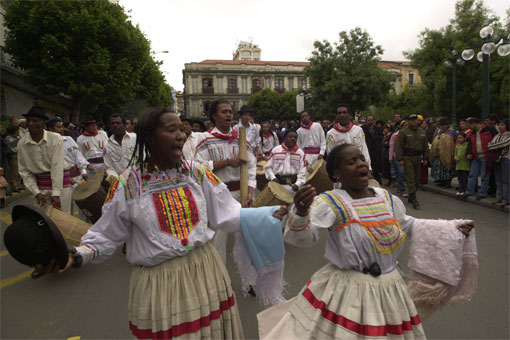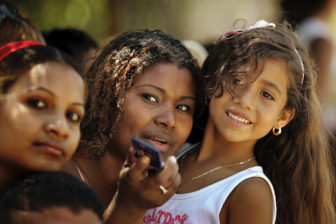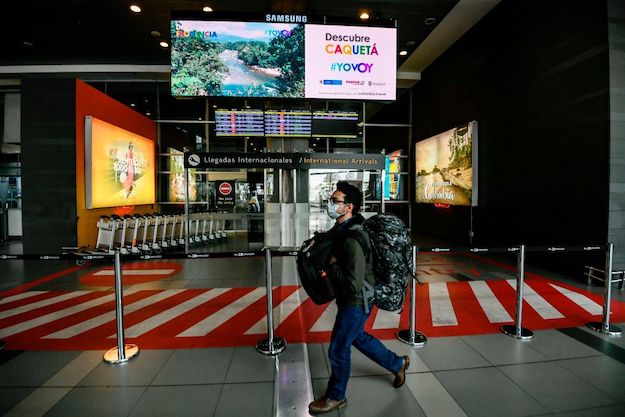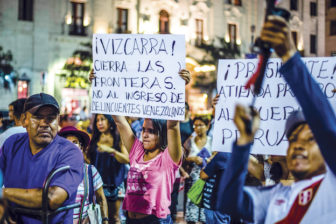Bolivia has a king. And he is not one of indigenous descent, but surprisingly, African. Julio Pinedo—one of the many Afro-Bolivians who make a living growing coca—found out a few years ago that he is a direct descendant of Bonifaz, a tribal king from Central Africa. Now, he’s the country’s first Afro-Bolivian king in 500 years.
“I had no idea about my royal lineage,” he says, humbly. “I knew my ancestors were, like other Africans, brought to work in the Bolivian gold and silver mines of Potosí. But because of the weather—it was too cold for the Africans to stay there—the Spaniards realized that they were losing slaves and had to move the ‘Afros’ to a place where the climate was friendlier.”
It was his great-grandfather who moved from the mines to the coca fields in Los Yungas region. There, others recognized his royal lineage but protected his identity from the patrons. That is until a secret crowning of Julio’s grandfather, “Bonifacio I,” in 1932. His grandfather, who was then leading the personnel at a country estate, raised King Julio “Bonifacio” Pinedo.
Years later, his crowning was not only a surprise for him as it was for many to find out that Afro-Latinos live in Bolivia.
So then, in what some label as a political move to make the world aware of the Afro-Bolivian presence, the community decided to go big and crown him at a ceremony in the country’s capital, La Paz, in December 2007. The dances, chants and drums of their ‘Saya’ music, inundated the city for a whole morning. “It was a glorious day,” the shy and silent King recalls from the small village of Mururata.
But this royal picture is not as glossy as it seems. Most Afro-Bolivians, including King Julio Pinedo, are poverty-stricken farmers that work all the year round, harvesting the coca leaves, citrus, coffee, banana or yucca, and hacking into the hard red earth with hoes. They are the poorest group inside South America’s second-poorest country, after Guyana.
One of them is José Iriondo, who back in 1967 fought with the Argentine-Cuban revolutionary Ernesto “Che” Guevara in eastern Bolivia. “When I was with Che I learned that we have to fight till the end. And I am now still fighting for the rights of the Afro-Bolivians, because we have to keep fighting,” he says.
Today, he works seven days a week and earns less than $30 a week, struggling to make ends meet.
Until recently more than 35,000 poverty-stricken Afro-Bolivians, like Mr. Iriondo, felt overlooked and even discriminated against. But now, for the first time since they arrived in Bolivia as slaves in the sixteenth century, attitudes toward them seem to be slightly changing. He feels happy that Afro-Bolivians are now recognized by the new Constitution pushed for by the country’s first indigenous president, Evo Morales, and passed by national referendum in January 2009. And now, finally, they have representation.
Jorge Medina used to run the Centro Afroboliviano para el Desarrollo Integral y Comunitario (CADIC) until he was elected as the first-ever Afro-Bolivian congressman a year-and-a-half ago. “I feel proud of being Afro-Bolivian and now, most of all, of representing my people. At last, we have an Afro-Bolivian with a voice,” he explains, adding that “the fact that we back this process of change led by an indigenous president does not mean the Afro-Bolivians are from the party of this indigenous president, simply that this process of change is allowing us and other voiceless peoples to show ourselves.”
Now, that they have grown stronger, they have developed links with several networks of Afro-descendants, mostly in Latin America and the Caribbean. “We are now working together on issues such as racial equality, to stop with racial discrimination, xenophobia, and intolerance around the region. We still have to work on that, Bolivia is still a racist country on several fronts.”
So nonetheless, despite the reforms adopted by President Morales to end discrimination against indigenous people and other vulnerable groups, such as the Afro-Bolivians, Mr. Medina warns the Afros are still at a disadvantage. “So we cannot rest, we still have to keep fighting for our rights; there is still discrimination and racism and people that want to put us down.”
Back in his town of Mururata, King Julio Pinedo feels “good and tranquil” in his role of having to be always watching over the needs of the Afro-Bolivian communities. But he echoes Mr. Medina’s views, and feels there is still some way to go: “We were slaved but we are not slaves anymore. Yet it is complicated because not many people understand us, and what we are fighting for.”







